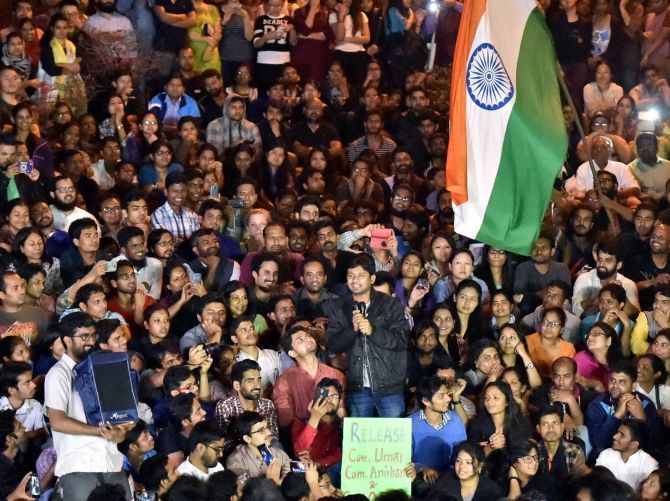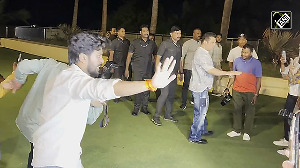Shekhar Gupta has a question for Kanhaiya Kumar, but a bigger, more vital, one for the honourable judge.
 Since this is the season of showering avuncular advice on 'bachchas' whether 'bhatke huye' (gone astray, our HRD minister's usage in Parliament) or not, there is no reason I should deny myself the pleasure.
Since this is the season of showering avuncular advice on 'bachchas' whether 'bhatke huye' (gone astray, our HRD minister's usage in Parliament) or not, there is no reason I should deny myself the pleasure.
If anything I'm qualified to do so from a higher pedestal of age, and I won't complain if somebody calls me an uncle in a newspaper headline for it.
So here I am, lecturing Kanhaiya Kumar. All your other Azaadi stuff is fine, young fellow, but why from 'poonjivad' (Capitalism)? What is your problem, bhatke huye bachche? It is capitalism that will make more of us equal and generate taxes to build a dozen public universities like JNU.
Having been done with this, I will move on to joining issue with some of the others proffering advice to our chosen student of the year. But I have a problem arguing with three most eminent counsellors.
Mr Bhim Sain Bassi, our most articulate and imaginative sleuth since Vividh Bharati's Inspector Eagle, has scared the hell out of me by enunciating a Stalinist view of jurisprudence: Guilty until proven innocent.
And frankly, much as I feel for the 'bachchas' locked up by him, beaten by lawyers under his watch and thus subjected to instant, T-20 style re-education, as a journalist I also have to be grateful to him for the headlines and prime time theatre he created and the laughs he gave us in these depressing times of broken politics.
I mean, show me another police chief of the capital of a nuclear weapons power mistaking a parody for the Twitter handle of a global terrorist (and India's most wanted man, with a $10 million bounty), warning the entire country's police about his 'threat' and even walking his trusting home minister into it.
What followed, is the good old Heartland-style khisiyani billi khamba noche (an embarrassed cat scratches the pole in anger). Take one look, Bollywood. This isn't the son, but grandmother of Wag the Dog and JNU -- with condoms, bones and female majority, is more interesting and even more Communist than Albania. I am, therefore, not fighting with Mr Bassi.
These are my reasons for not fighting with Mr Bassi. The problem with the second one, the formidable HRD minister, is a simpler one. I simply do not have the articulation, vocabulary or the intellect to match hers. So a walkover is called for.
That leaves me just one. And the problem in this case is, how to argue with an honourable judge. But since judges always say their shoulders should be broad enough to tolerate some sincerely journalistic indiscretion, I am seeking their indulgence.
I am emboldened also by venerable old lawyer and Constitutionalist Fali Nariman making the same point to me in a Walk the Talk recording this (March 4) morning: It is good that the judge advised the student to not indulge in such activities.
But why drag in our soldiers on the borders and say they protect our freedoms? Of course, our gallant soldiers do a great job, but our Constitution protects our freedoms with our institutions, judiciary, Parliament. It would be more convenient for me to simply fire this from his formidable shoulder -- but let me dare to widen his argument.
Of course, the judge took a wonderfully liberal decision to use just a shot of antibiotic instead of the scalpel on Mr Kumar. She has also been fair enough to say that the investigation is at a nascent stage and therefore no finding on guilt can be made out. But you'd be foxed by the line that says time in jail would have given Mr Kumar time to introspect? Over what, if he has done nothing wrong?
Again, I won't dare to claim yet he is innocent. But only as much as he is not guilty yet. Why should he be denied his liberty to introspect as a mere suspect? Are we running thought prisons? Our own Gulags, I humbly ask? Most certainly not.
We do not send mere suspects to jail, get them beaten by lawyer mobs 'until they wet their pants' and have the police interrogate them for days to make them introspect if they are not yet guilty. Surely our judiciary does not accept the Bassi formulation: Guilty until proven innocent.
The next is the point that Mr Nariman highlighted and a point I dared to raise too: Who protects our Constitutional freedoms -- our institutions including the judiciary, or our armies? That is the argument I am joining with the greatest humility.
I am also daring to do so because Google tells me that the honourable judge and I are about the same generation, one whose nationalism was defined by Manoj Kumar's Mr Bharat singing in Mahendra Kapur's macho voice for almost a decade, and one that probably saw the film Upkar from where she quotes the famous patriotic song, Mere Desh Ki Dharti at the same impressionable age, in class six or seven.
I am a child of the stormy, insecure, 1960s when we also sang in school, Nanha Mmunna Rahi Hoon, Desh Ka Sipahi Hoon and, that awful one, Aati Hai Awaz Yehi Mandir, Masjid, Gurdwaron Se; Sambhal Ke Rehna Apne Ghar Mein Chhupe Huye Gaddaron Se (the call from all places of worship is to watch out for traitors hiding in your own home).
So my second argument is that we thought we had left that suspicious, traitor-my-neighbour mindset far, far behind. Indian nationalism has evolved from the '60s and we are an enormously more confident nation. Diverse thoughts cannot subvert us.
I must confess I am also terminally influenced by long years of covering Pakistan, where the army is central to the ideology that defines its nationalism. The essential argument that gives its army a central position in the power structure is that it guards the ideology of Pakistan which hasn't had a stable constitution until recently.
I was in Pakistan in the summer of 1990 when Benazir Bhutto, the prime minister, raised a question nobody should dare to in Pakistan: Is the army the guardian of Pakistan's ideological frontiers or territorial ones?
Remember, this was just after the unravelling of the Soviet Bloc. If armies could protect ideologies, she asked, why would the Soviet Union disintegrate? A small point to add: She said it in a speech to her armed forces staff college in Quetta.
Better informed Pakistanis told me she wouldn't last more than a few days or weeks. There is no way an elected prime minister could get away raising this in Pakistan. Particularly as she rubbed her finger in her generals' eyes in their own institution.
I thought this was exaggerated. But indeed she did not last more than a few weeks. Among the allegations made by the Fauji Establishment against her was sedition/treason, of being pro-India and so on.
India has never needed this debate. Our brilliant, valiant armies protect our territorial frontiers and the civilian State, Constitutionally elected and duly established by law.
Freedoms and rights of citizens are the responsibility of Parliament, judiciary, civil society. In fact, even when a soldier, a jawan or a general feels a sense of injustice, he goes to our brilliant judiciary. That's where, as they say in a courtroom, I rest my case, Your Lordship.












 © 2025
© 2025